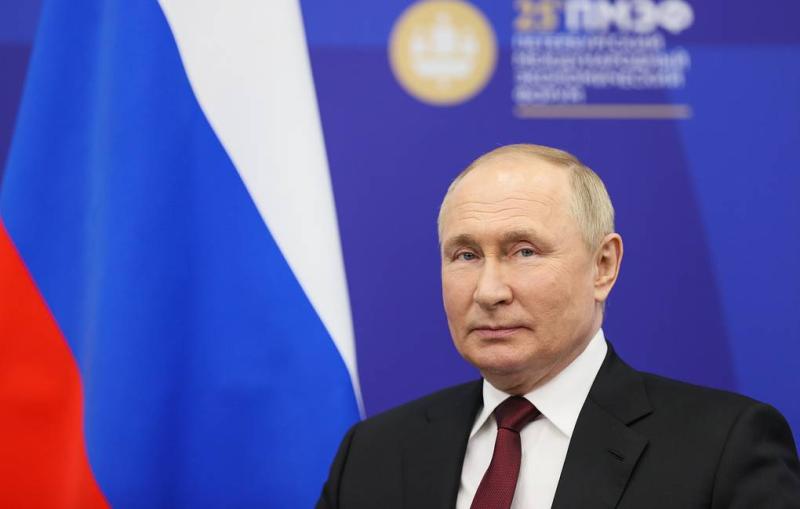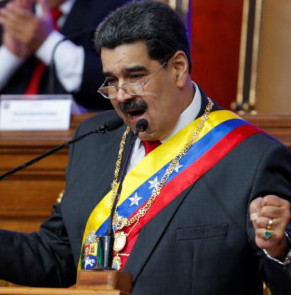
© Gavriil Grigorov/TASS
The 25th anniversary edition of the St. Petersburg International Economic Forum (SPIEF): New Opportunities in a New World has come to an end. The June 17th plenary session featured a speaking engagement by Russian President Vladimir Putin, with his Kazakh and Egyptian colleagues Kassym-Jomart Tokayev and Abdel Fattah el-Sisi (the latter via video call) taking part as well. Chinese President Xi Jinping addressed the forum with a live video speech. None of official representatives from countries unfriendly to Russia have been invited.
This time, the forum was for the first time attended by delegations from the DPR and LPR recently recognized by Russia, testifying to the fact that the new world is totally different from the old one. Yet another proof of this was the sensational visit by a delegation from Afghanistan’s Taliban leadership. In Russia, the movement is prohibited as a terrorist one, but tgis did not prevent them from taking part in the forum to negotiate the supply of energy resources and grain to Afghanistan with Russian companies. Still, the Russian authorities have not recognized the new government as legitimate and is not even going to do so, the president’s press secretary Dmitry Peskov emphasized. In general, SPIEF-2022 brought together over 13.5 thousand participants from more than 40 countries, including 1,244 Russian and 265 foreign companies. Covering the event were nearly 4.2 thousand journalists from 30 countries.
Let's take a closer look at Vladimir Putin's forum speech, which was mainly devoted to the country’s economic development. He focused on the challenges Russia faces today and will face tomorrow like ensuring further economic development, stimulating national business activity, creating conditions for comfortable business operations, strengthening external trade and investment ties.
According to the Russian leader, Western sanctions open up new opportunities for the country. In his opinion, the very structure of restrictions has originated from a false premise that Russia’s economy is not a sovereign one. Sovereignty cannot be segmented or fragmented in the 21st century, the President stressed, pointing to the need of “strengthening everything that determines our country’s economic, financial, professional and technological independence.” "It is obvious that it is up to the strong sovereign states, those that do not follow a trajectory imposed by others, to set the rules governing the new world order. Only powerful and sovereign states can have their say in this emerging world order. Otherwise, they are doomed to become or remain colonies devoid of any rights," Vladimir Putin stressed. " Unless we have sovereignty, we will soon have to buy everything and will only produce oil, gas, hemp fibre, saddles and sell rough logs abroad."
Putin noted that everyone who keeps working with Russia is subjected to blatant pressure from the United States and Europe, and it even comes to direct threats. But Russia will “certainly continue to cooperate with Western companies that have remained in the Russian market despite the unprecedented arm-twisting.”
The Russian leader said the current forum was taking place at a difficult time when the very principles of the global economic system have taken a blow. Putin also assessed both the formation of a multipolar economic pattern and all the opportunities and prospects that come with it for those engaged in global market activities. He called the current economic and political changes “tectonic” and “revolutionary”, saying particularly the following: "The ruling elite of some Western states seem to be harboring this kind of illusions. They refuse to notice obvious things, stubbornly clinging to the shadows of the past. For example, they seem to believe that the dominance of the West in global politics and the economy is an unchanging, eternal value. Nothing lasts forever.”
According to Putin, our Western partners have deliberately undermined fundamental business notions “in order to preserve obsolete geopolitical illusions… After declaring victory in the Cold War, the United States proclaimed itself to be God’s messenger on Earth, without any obligations and only interests which were declared sacred. And countries of the so-called «golden billion» consider everything a backwater, or their backyard... A world built on a doctrine of this kind is definitely unstable." The head of state believes that Western countries "shamelessly impose their ethics, their views on culture… Everything goes, even sports, the Olympics." And yet, Vladimir Putin hopes "common sense prevails and they realize that we need to treat each other with respect."
Also, Vladimir Putin dwelled on the Ukrainian issue. The president accused the West of pumping weapons into the country and financing anti-Russian sentiments. As for the grain, there are several options for exporting Ukrainian grain, but it is up to the Kiev authorities alone to decide, "without taking the lead from their masters across the ocean." The head of state said the following about Western speculations on Ukrainian wheat: "We are not hindering Ukrainian food supplies to global markets. We did not mine the Black Sea ports of Ukraine." Moreover, Russia is able to scale up its food and fertilizer exports, with grain exports reaching 50 million tons the next season. “The United States has turned from a net exporter of food into a net importer, it is printing money and… buying food products all over the world,” Putin noticed.
Answering Ukraine-related questions by forum moderator Margarita Simonyan, the Rossiya Segodnya media group and RT TV channel editor-in-chief, Putin said Russia was forced to go ahead with its special operation, while the United States supported the coup in Ukraine in 2014 and started “implementing an anti-Russia scenario there.” In this part of his speech, Putin assured the audience that Russia's actions in the Donbas do not run counter to international law, unlike those taken by the United States in Libya and Iraq. Russia does not threaten anyone with nuclear weapons but will use them, if necessary, to protect its own sovereignty.
President Putin predicted that the coming years would see the world launch the process of converting gold and foreign exchange reserves from weakening currencies into real resources. Russia has nothing to do with skyrocketing energy prices in Europe, as fuel began to rise in price long before the special operation kicked off. The Russian leader also touched upon the "Putin inflation" myth: "I wonder who they expect would buy this nonsense – people who cannot read or write, maybe. The operation we launched in Donbass is a lifeline they are grabbing at to be able to blame their own miscalculations on others, in this case, on Russia." The current global situation had become a fact of life long before the events of this year. The world has been driven into this situation, little by little, by many years of irresponsible macroeconomic policies pursued by the G7 countries,” Putin stressed.
According to the Russian leader, the EU has lost its political sovereignty, its bureaucratic elites are dancing to someone else's tune, hurting their own people. “The real interests of people and national businesses are being pushed further and further to the periphery.” Looking into the future, Putin predicted more inequality in Europe and a subsequent social split resulting from economic mistakes. In his opinion, the current circumstances will lead to a surge in radical movements and a change of elites in the short term. European politicians have already dealt their economies a serious blow all by themselves, and calculable losses from the sanctions fever could exceed $400 billion this year. And “these outlays fall directly on the shoulders of people.” Putin is sure that sanctions against Russia will obviously make European Union lose its global competitiveness.









